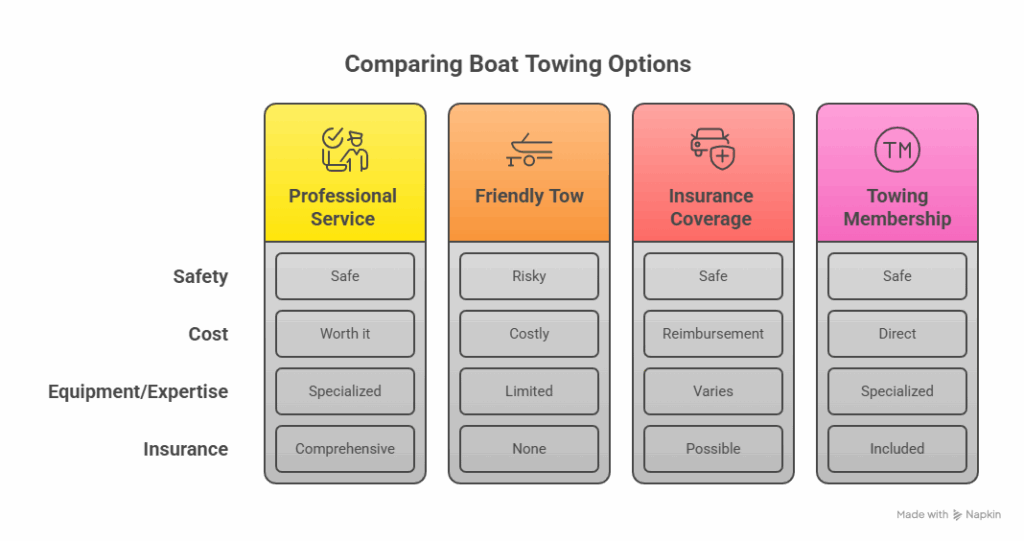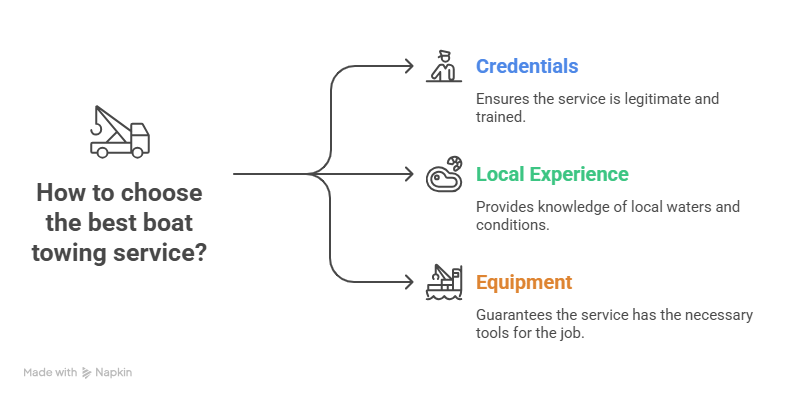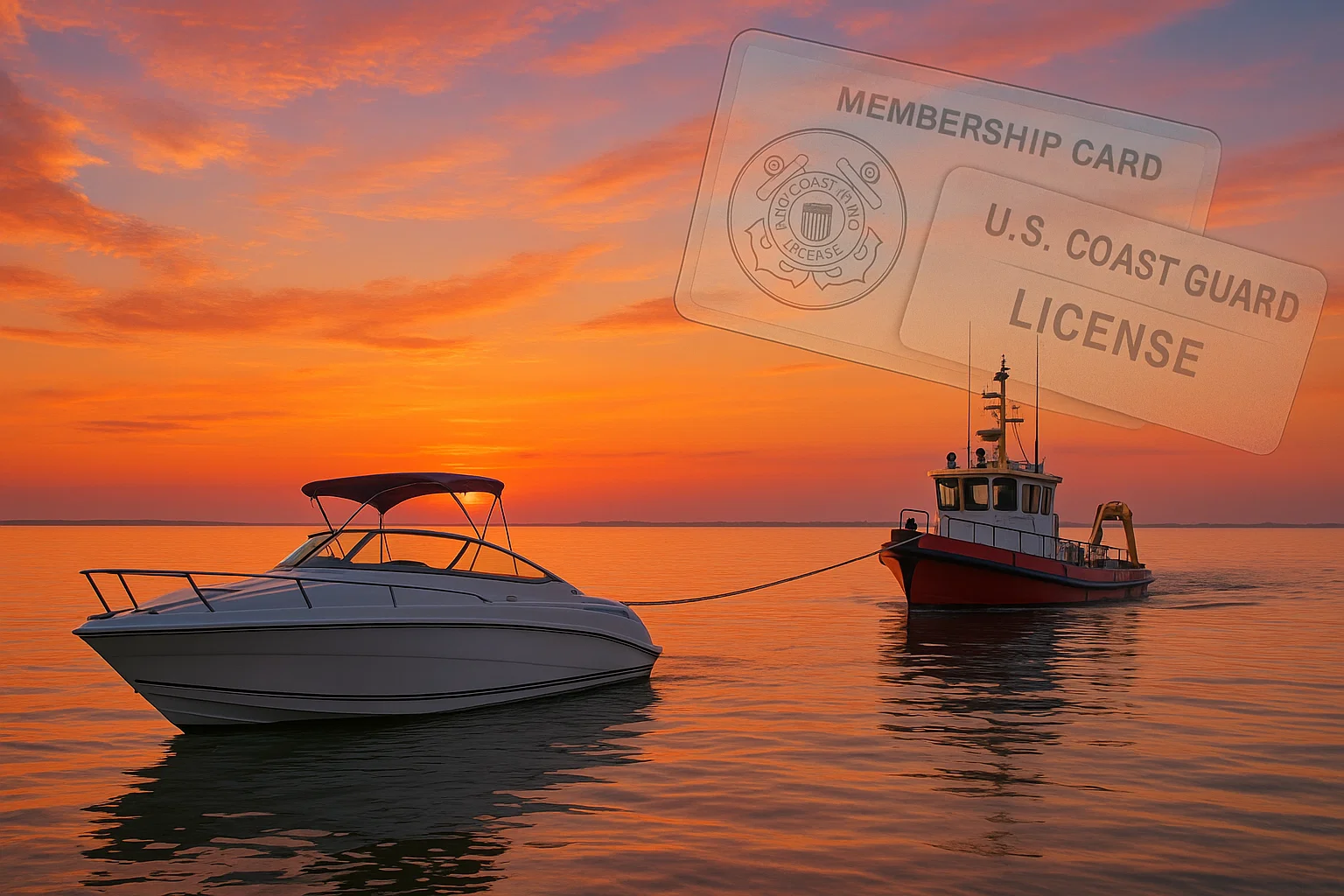Finding the Best Boat Towing Service: My 15 Years of Lessons on the Water
I’ve been a marine mechanic in South Florida for 15 years, fixing boats from Miami to Fort Lauderdale, and I’ve seen too many folks stranded because they didn’t have a solid towing service. Last July, a guy named Javier at Dinner Key Marina called me in a panic—his Sea Ray 350’s engine died five miles off Key Biscayne, and he was drifting toward a shipping lane. I hooked him up with a Sea Tow captain who got him back safely for $200, thanks to his membership. Without it, he’d have faced a $1,200 bill. Here’s my take on picking the best boat towing service to keep you safe and save your wallet.
Table of Contents
Why Is a Professional Boat Towing Service Non-Negotiable?
A dead engine in the middle of the ocean isn’t just annoying—it’s a safety risk that can spiral fast. I’ve towed boats myself, and I’ve seen what happens when folks rely on “friendly tows” instead of pros. Spoiler: it’s a mess.
Picture this: you’re stuck off Stiltsville, current pushing you toward rocks. A professional towing service like Sea Tow or TowBoatUS isn’t just a phone call—it’s your lifeline. They’ve got the gear and know-how to save your boat without wrecking it. Last summer, a client’s Bayliner 285 took a $2,000 hit because a buddy’s tow snapped a cleat—pros would’ve avoided that.
What Are the Risks of an On-Water Breakdown?
Breakdowns aren’t just inconvenient; they’re dangerous. Drifting into a channel or hitting a squall without power can turn a bad day into a disaster. I’ve seen simple battery issues become emergencies when seas get rough—happened to a guy at Coconut Grove last June, nearly cost him his $80,000 yacht. Professionals use specialized bridles and pumps, unlike a friend’s ski rope that might snap and hurt someone. Trust me, you don’t want that headache.
Why Avoid “Friendly Tows”?
A well-meaning boater offering a tow seems great—until it isn’t. If their boat damages yours, good luck with insurance; most don’t cover “friendly tows.” I saw a case at Bahia Mar where a guy’s “helpful” tow cracked his friend’s hull—$3,500 in repairs, no coverage. Pros carry comprehensive liability insurance, like the policies Sea Tow mandates (U.S. Coast Guard, 2025). Plus, their captains are trained to avoid secondary damage—worth every penny.
How Does Insurance Compare to a Towing Membership?
Boat insurance might cover towing, but it’s usually reimbursement-based—pay $800 upfront, then fight for a refund. I had a client in 2023 who waited three months for a $600 claim. Memberships like TowBoatUS or Sea Tow mean one call, no wallet needed. Their direct assistance saved Javier’s day off Key Biscayne—zero out-of-pocket stress. It’s a no-brainer for peace of mind.

What Should You Check When Vetting a Towing Service?
Not every towing service is legit. I’ve seen shady operators in Miami who’ll leave you stranded or overcharge you. Here’s how I vet services to ensure they’re the best boat towing service for my clients.
What Credentials Matter Most?
Start with the basics: the captain needs a U.S. Coast Guard license—non-negotiable. It proves they’re trained for commercial towing (U.S. Coast Guard, 2025). Next, check for comprehensive liability insurance; it protects your boat if something goes wrong. I once recommended a service to a buddy, Carlos, only to learn they skipped insurance—his $1,500 tow ended with a scratched hull and no recourse. Also, look for certifications like ABYC or industry training—they show commitment.
Why Does Local Experience Count?
A license is great, but local know-how is gold. A captain who knows Miami’s channels like the back of their hand can navigate a squall or shallow flats better than an outsider. At Bahia Mar last year, a Sea Tow captain dodged a storm to rescue a stranded Grady-White 208—saved the owner $2,000 in potential damage. Ask around your marina; boaters at Dinner Key swear by their local TowBoatUS franchise. Real-world endorsements beat online reviews any day.
What Equipment Should a Towing Service Have?
The best boat towing service has gear built for the job. Their boats need high-capacity pumps, jump-start packs, and specialized lines for your vessel—whether it’s a 20-foot center console or a 50-foot cruiser. I checked out a Sea Tow rig at Fort Lauderdale’s marina last month—clean, loaded with dewatering pumps and soft ungrounding tools. That’s the kind of setup you want, not some guy with a rope and a prayer.

How Do Sea Tow and TowBoatUS Compare?
Sea Tow and TowBoatUS dominate the towing game, but they’re not identical. I’ve worked with both in South Florida, and each has its strengths. Here’s my breakdown to help you pick the best boat towing service for your boating style.
Why Get a Towing Membership?
A membership is like insurance for your sanity. For about $200 a year, you get unlimited towing, fuel delivery, jump starts, and priority dispatch. Without it, a single tow can hit $500–$1,200—ask my client Maria, who paid $800 out-of-pocket in 2022 before joining Sea Tow. Memberships cover you, your family, and any boat you’re on, making it a steal compared to per-incident costs.
What’s the Difference Between Sea Tow and TowBoatUS?
Both offer towing, soft ungroundings, and emergency help, but their coverage models differ. Sea Tow’s “no home port” policy follows you anywhere—perfect for cruisers like me who hop between Miami and the Keys. TowBoatUS sticks to defined service areas but shines with local networks and their Trailer Assist add-on for trailered boats. Last July, a TowBoatUS captain in Coconut Grove got my buddy’s Boston Whaler back in 30 minutes—local expertise at its best.
| Service | Coverage Model | Key Perks | Cost (Annual) |
| Sea Tow | No home port, follows you | Unlimited towing, flexible use | ~$200 |
| TowBoatUS | Defined service areas | Trailer Assist, strong local ties | ~$200 |
I put this table together from my chats with local captains in Miami—hope it helps you decide.
How Do I Choose Based on My Boating Style?
If you’re a long-distance cruiser hitting new waters, Sea Tow’s flexibility is a lifesaver—I used it on a chartered yacht in the Bahamas last spring, no hassle. If you stick to local spots like Fort Lauderdale and trailer your boat, TowBoatUS’s Trailer Assist and local crews are hard to beat. Ask your marina’s dockmaster; they’ll know who’s got the strongest presence in your area.
How Much Does Boat Towing Really Cost?
Costs can sneak up on you if you’re not prepared. I’ve seen owners shocked by bills because they didn’t understand the fine print. Here’s what you’ll pay with the best boat towing service and what’s not covered.
What’s Included in a Membership Fee?
A premium membership like TowBoatUS’s Unlimited Gold or Sea Tow’s Gold plan runs ~$200/year. It covers towing, fuel drops (you pay for fuel), jump starts, and priority service. My client Javier’s $200 Sea Tow plan saved him from a $1,200 tow bill last summer. Some plans include family members or multiple boats—check the terms. Always confirm the service area; “unlimited” doesn’t mean global.
How Expensive Is a Pay-Per-Incident Tow?
Without a membership, you’re on the hook for everything. A basic tow in calm waters starts at $300–$500, but add night, rough seas, or distance, and it’s $800–$1,200. I saw a guy at Key Biscayne pay $1,500 for a nighttime tow in 2023—no membership, no mercy. Soft ungroundings can hit thousands. A membership pays for itself after one incident.
What’s Not Covered by a Membership?
Here’s the big one: towing isn’t salvage. Towing covers a floating boat with a mechanical issue—like a dead battery. Salvage is for boats in “imminent peril” (sunk, sinking, hard aground) and costs a percentage of your boat’s value—think $5,000–$20,000 for a $100,000 yacht. Other uncovered services include hard groundings or non-emergency moves. I learned this when a client’s salvage job in Miami cost $10,000—ouch.
FAQ: Your Questions About the Best Boat Towing Service Answered
What Makes a Boat Towing Service the Best?
The best boat towing service has U.S. Coast Guard-licensed captains, comprehensive insurance, and local expertise. I’ve seen Sea Tow and TowBoatUS save boats in Miami because they know the waters. Check marina reviews for real-world feedback.
How Do I Know If a Towing Service Is Reliable?
Look for a Coast Guard license and liability insurance—non-negotiables. Ask local boaters; at Dinner Key, everyone raves about TowBoatUS’s quick response. I’d also visit their dock to see their gear—clean boats mean pros.
Why Is a Membership Better Than Paying Per Tow?
A $200 membership saves you from $500–$1,200 tow bills. My client Maria paid $800 out-of-pocket in 2022 before joining Sea Tow—now she’s covered for $200/year. It’s a no-brainer for frequent boaters.
What’s the Difference Between Towing and Salvage?
Towing is for mechanical issues on a floating boat—covered by memberships. Salvage is for sunk or hard-aground boats, costing 5–20% of your boat’s value. I saw a $10,000 salvage bill in 2023—know the difference.
Should I Choose Sea Tow or TowBoatUS?
Sea Tow’s great for cruisers with its “follow-you” coverage—I used it in the Bahamas. TowBoatUS suits local boaters with Trailer Assist. Ask your marina which has the best local presence.
What Equipment Should a Towing Service Have?
Pros need high-capacity pumps, jump-start packs, and specialized lines. I checked a Sea Tow boat at Fort Lauderdale—loaded with dewatering gear. That’s what you want for your $80,000 boat.
How Can I Save Money on Boat Towing?
Get a $200 membership to avoid $500–$1,200 tow bills. Compare Sea Tow and TowBoatUS plans at boatertalk.com for deals. I saved a client $800 last year with a membership—worth it.
Why Does Local Knowledge Matter for Towing?
Local captains know your waters’ quirks—sandbars, currents, storms. A TowBoatUS captain in Coconut Grove dodged a squall to save a boat last July. Ask your dockmaster who’s best locally.
Can My Insurance Cover Towing Costs?
Insurance often reimburses towing, but you pay upfront—$500 or more. Memberships like Sea Tow offer direct help, no cash needed. I’ve seen clients wait months for insurance refunds—skip the hassle.
What Are the Risks of Not Having a Towing Service?
You’re gambling with safety and money. Drifting into a channel or paying $1,200 for a tow hurts. I saw a guy lose $3,500 to a “friendly tow” gone wrong—get a membership.
Conclusion: Invest in the Best Boat Towing Service for Peace of Mind
Choosing the best boat towing service isn’t just about avoiding a bad day—it’s about ensuring every trip starts with confidence. I’ve seen too many boaters at Bahia Mar regret skipping a $200 membership when a $1,200 tow bill hits. Vet your provider, match their coverage to your boating style, and know the difference between towing and salvage. Head to your marina this week—ask who’s got the best rep, Sea Tow or TowBoatUS. That local insight, paired with my tips, will keep you safe and save you thousands.
Author Bio
I’m Alex, a marine mechanic with 15 years of experience fixing boats across South Florida, from Miami to Fort Lauderdale. I’m ABYC-certified and have towed or repaired 200+ vessels, from Sea Rays to Boston Whalers.


Leave a Reply